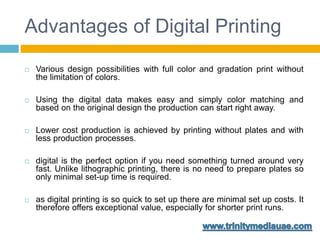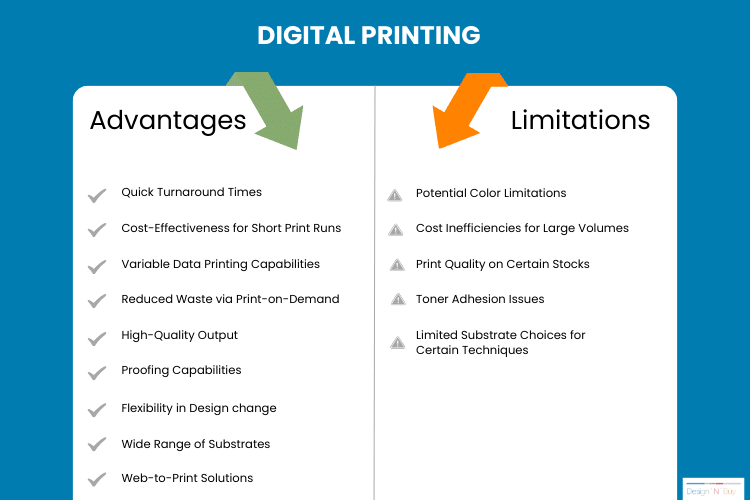The Definitive Guide for Digital Printing
Table of ContentsThe Buzz on Digital PrintingFascination About Digital Printing10 Simple Techniques For Digital PrintingOur Digital Printing StatementsDigital Printing Fundamentals Explained8 Easy Facts About Digital Printing Explained
Variable data printing, such as direct mail with customized codes and addresses, is preferably fit for electronic printing. Digital quick printing just needs 4 actions of layout, evaluation, printing and binding to get everything done. Digital fast printing has an unmatched advantage: print on need.According to PMMI, digital printing permits brands and suppliers to respond quickly to consumer needs while boosting the supply chain, minimizing warehousing price and waste, and delighting in faster time to market. That all noises great, however exactly how does this technology do all that? The major differentiator of these innovations is that there are no set-up costs and no plates with digital printing.
The 7-Minute Rule for Digital Printing
According to Wikipedia, the best distinction between electronic printing and traditional methods such as lithography, flexography, gravure, or letterpress - Digital Printing is that there is no requirement to change printing plates in digital printing, whereas in these analog printing techniques home plates are repetitively changed. This results in quicker turn-around time and decreases cost when using digital printing.
Digital printing is extremely flexible, so it's very easy to make changes to the plan style quickly. It all goes back to the plates.
Extra inventory can imply more waste down the roadway. With standard printing techniques, short-run printing is simply not feasible. Due to the fact that a fantastic layout can make or break your product, electronic printing constantly creates top notch, clear and vibrant graphics each time. Digital printing on flexible pouches adds the bright, vivid, and accurate graphics that almost beckon customers to connect and touch them.
Digital printing is the procedure of printing digital-based images straight onto a selection of media substrates. There is no demand for a printing plate, unlike with offset printing. Digital files such as PDFs or desktop posting files can be sent directly to the digital printing machine to print theoretically, picture paper, canvas, fabric, synthetics, cardstock and other substratums.
Digital Printing for Beginners
According to PMMI, electronic printing permits brand names and suppliers to react quickly to client demands while boosting the supply chain, decreasing warehousing cost and waste, and delighting in faster time to market. That all noises terrific, however how does this modern technology do all that? The major differentiator of these modern technologies is that there are no set-up costs and no plates with electronic printing.
This results in quicker turn-around time and lowers price when utilizing digital printing.

The Single Strategy To Use For Digital Printing
With traditional printing approaches, short-run printing is just not feasible. Because a wonderful style can make or damage your item, electronic printing continually produces top quality, clear and colorful graphics each time.

According to PMMI, digital printing allows brand names and manufacturers to react promptly to consumer demands while boosting the supply chain, lowering warehousing expense and waste, and appreciating faster time to market. That all sounds excellent, yet how does this innovation do all that? The major differentiator of these technologies is that there are no set up fees and no plates with electronic printing.
What Does Digital Printing Do?
This results in quicker turnaround time and reduces expense when using digital printing.
Digital printing is highly adaptable, so it's very easy to make changes to the plan design swiftly. additional resources It all goes back to the plates.

The Basic Principles Of Digital Printing
Digital printing is the process of printing digital-based pictures directly onto a range of media substratums. There is no demand for a printing plate, unlike with balanced out printing. Digital files such as PDFs or desktop computer publishing data can be sent straight to the electronic printing machine to print on paper, photo paper, canvas, fabric, synthetics, cardstock and various other substratums.